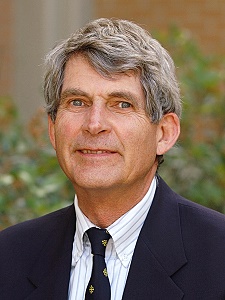
Floyd F. Feeney
Homer G. and Ann Berryhill Angelo Professor of Law for International Legal and Communications Studies
When Floyd Fulton Feeney died unexpectedly of a cold that had progressed to pneumonia on January 8, 2019, the School of Law lost a brilliant scholar, beloved colleague, and legendary teacher. Floyd joined the faculty in January 1968 and taught his first classes that fall, just two years after the school admitted its first class. Fifty-one years later, at 85, he was still working full time. As Dean Kevin Johnson said, “Floyd Feeney was the heart and soul of the law school, a person whose grace, respect for all, and commitment to excellence represented all that was great about Martin Luther King Jr. Hall.”
The son of Burla Leighton Feeney and Ona Marie McMillin Feeney, he was reared in Charlotte, NC, with summers on the McMillin family farm near Franklin, IN. His mother died suddenly just before his eighth birthday. But when he was nine, his father married Buena Criminger and he gained a loving stepmother.
Always understated, Floyd’s remarkably accomplished life was the product of his gifts, determination, and hard work. A soft-spoken man with a stellar intellect, innate physical abilities, and healthy sense of fun, he was also a natural leader. At Davidson College, he played varsity basketball, captained varsity track, was president of the student government, and graduated in 1955 with Honors in History. He maintained this combination of excellence, leadership, and athletic activity throughout his life. Most impressively, he never rested on his laurels nor took anything for granted. Instead he always worked longer and harder than anyone else, while also reserving time for his family, friends, and sports.
A Root-Tilden Scholar at NYU School of Law, his studies were interrupted by army service that included a tour in West Germany. Hardly missing a beat, after his return, he capped his studies as Editor-in-Chief of the Law Review and, at his 1960 graduation, received the law school’s award as its outstanding graduate. Next, after a year in private practice, he served as law clerk to Hugo L. Black during the US Supreme Court’s 1961 Term.
During the six years following his clerkship he held a series of prestigious positions as Special Assistant to the Solicitor of Labor, Deputy Special Counsel to the President’s Committee on Equal Employment Opportunity, Special Assistant to the Administrator of the Agency for International Development, and, finally, Assistant Director of the President’s Commission on Law Enforcement and Administration of Justice.
Then, in 1968, he became Executive Director of UCD’s new interdisciplinary Center on Administration of Criminal Justice, and it flourished under his leadership. His appointment was 67% FTE in the Center and 33% FTE on the law faculty until the Center closed in 1987 and his law faculty FTE increased to 100%.
The Center’s projects changed criminal procedure in fields as diverse as juvenile law, felony prosecutions, the exclusionary rule, robbery, bail, misdemeanors, and corrections. During just one six-year period, faculty from eight departments at three UC campuses conducted Center research.
Floyd’s scholarship was in two fields: criminal procedure and election law. His interdisciplinary co-authorships included research with sociologists, political scientists, statisticians, criminologists, a psychologist, and a probation officer. He also worked in comparative law to enrich his analysis.
His international comparative law work began in 1983-1984 as Director of the London office of the Vera Institute of Justice, extended to Germany and Switzerland during a 1995-1996 Fulbright to the University of Augsburg, and then broadened to the People’s Republic of China, where he had briefer stays at the China Youth College for Political Science (1997) and the China University of Political Science and Law (CUPL) (2004). There, he shared his expertise on American and German law as the country pursued law reform. Over the years, he consulted both here and abroad, and lectured in Germany, Italy, Japan, Mexico and the United Kingdom.
At home, he became the founding Director of the law school’s LLM program in 1997, a position that he held for 17 years. Understanding the challenges of living abroad and speaking a foreign language, Floyd was a warm host, helping students however he could and making sure that they felt welcome. He took a similar role when foreign judges and lawyers came to conduct research and facilitated a continuing exchange program with CUPL.
As a teacher, Floyd’s conscientious and creative class preparation became legendary. He was one of the few to receive the school’s Distinguished Teaching Award twice, in 1986 and 2008. Five classes invited him to speak at their graduations, and many more chose him as one of the two faculty members who would hood them, most recently, in each of the last three years.
Deeply committed to self-governance, Floyd took on demanding roles in the law school, for the UC Davis Faculty Association, and for the Academic Senate (most notably on CAP and Privilege and Tenure). His service to courts, the California legislature, and other public bodies was similarly extensive and significant.
A cogent and prolific writer, Floyd Feeney was one of the great legal scholars of his time. Most gratifying to him were the impact of his juvenile court work with Roger Baron, which diverted status offenders to family counseling, and his books with Philip Dubois on the California initiative process, with Joachim Herrmann on American and German criminal procedure, and, with Liling Yue as third co-author, a later volume that added Chinese criminal procedure.
He is survived by his daughters, Elizabeth Feeney of Ampthill, England and Linda Feeney Fessler of Fresno; his grandchildren, William Benn, Michael Fessler, Rupert Smith, Zachary Smith and Kathleen Fessler; and his sisters, Margaret Feeney Mattison of Spartanburg, SC, and Dorothy Feeney Matthews of Houston, TX. Talking to them gave him great joy; spending time with them meant everything.
He will be sorely missed.
Carol Bruch
Edward Imwinkelried
Robert Hillman
